Related Research Articles

Herbert Jeffrey Hancock is an American jazz musician, bandleader, and composer. Hancock started his career with trumpeter Donald Byrd's group. He shortly thereafter joined the Miles Davis Quintet, where he helped to redefine the role of a jazz rhythm section and was one of the primary architects of the post-bop sound. In the 1970s, Hancock experimented with jazz fusion, funk, and electro styles, using a wide array of synthesizers and electronics. It was during this period that he released perhaps his best-known and most influential album, Head Hunters.

Anthony Tillmon Williams was an American jazz drummer. Williams first gained fame as a member of Miles Davis' "Second Great Quintet," and later pioneered jazz fusion with Davis' group and his own combo, the Tony Williams Lifetime. In 1970, music critic Robert Christgau described him as "probably the best drummer in the world." Williams was inducted into the Modern Drummer Hall of Fame in 1986.

Frederick Dewayne Hubbard was an American jazz trumpeter. He played bebop, hard bop, and post-bop styles from the early 1960s onwards. His unmistakable and influential tone contributed to new perspectives for modern jazz and bebop.
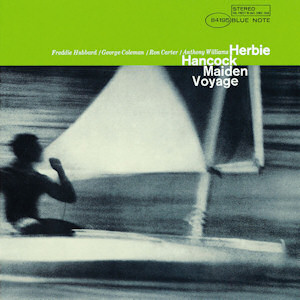
Maiden Voyage is the fifth album led by jazz musician Herbie Hancock, and was recorded by Rudy Van Gelder on March 17, 1965, for Blue Note Records. It was issued as BLP 4195 and BST 84195. Featuring Hancock with tenor saxophonist George Coleman, trumpeter Freddie Hubbard, bassist Ron Carter and drummer Tony Williams, it is a concept album aimed at creating an oceanic atmosphere. As such, many of the track titles refer to marine biology or the sea, and the musicians develop the concept through their use of space. The album was presented with the Grammy Hall of Fame Award in 1999.

Seven Steps to Heaven is a studio album by the jazz musician Miles Davis. It was released through Columbia Records on July 15, 1963. The recording took place at Columbia Studios in Los Angeles in April 1963, and at Columbia's 30th Street Studios in Manhattan in May 1963. It presents the Miles Davis Quintet in transition, with the New York session introducing the rhythm section of Herbie Hancock, Ron Carter and Tony Williams, who would become Davis' regular sidemen for the next five years. Upon release, the album was Davis' most successful on the Billboard pop LPs chart up to that point, peaking at number 62.
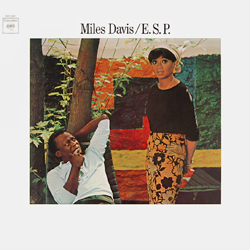
E.S.P. is an album by Miles Davis, recorded on January 20–22, 1965 and released on August 16 of that year by Columbia Records. It is the first release from what is known as Davis's second great quintet: Davis on trumpet, Wayne Shorter on tenor saxophone, Herbie Hancock on piano, Ron Carter on bass, and Tony Williams on drums. The album was named after a tune by Shorter, and was inspired by the fact that, "since Wayne Shorter's arrival, the five members of the quintet seemed to communicate by mental telepathy."

Miles Smiles is an album by the jazz musician Miles Davis. It was released on February 16, 1967 through Columbia Records. It was recorded by Davis and his second quintet at Columbia 30th Street Studio in New York City on October 24 and October 25, 1966. It is the second of six albums recorded by Davis' second great quintet, which featured tenor saxophonist Wayne Shorter, pianist Herbie Hancock, bassist Ron Carter, and drummer Tony Williams.
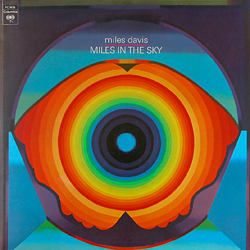
Miles in the Sky is a studio album by the jazz trumpeter and composer Miles Davis. It was released on July 22, 1968, through Columbia Records. It was the last full album recorded by Davis' "Second Great Quintet" and marked the beginning of his foray into jazz fusion, with Herbie Hancock playing electric piano and Ron Carter playing electric bass guitar on opening track “Stuff”. Additionally, electric guitarist George Benson features on “Paraphernalia”.

The Complete Live at the Plugged Nickel 1965 is a live box set of the Miles Davis Quintet, recorded on December 22 and 23, 1965. First released in Japan in March 1992 by Sony Records as a 7 disc set, it was re-released on Legacy Records in July 1995 as an 8 disc set. In conjunction with Legacy, Mosaic Records released a 10 LP set. It was re-released as an SA-CD Box in October 2023 in a limited edition of 1500 by Sony Japan for Tower Records Japan. It comprises recordings of seven performance sets over the two nights by the second great Davis quintet at the now-defunct Plugged Nickel nightclub in Chicago. A single-disc sampler, Highlights from the Plugged Nickel was released by Legacy on November 14, 1995, and was reissued on February 1, 2008.
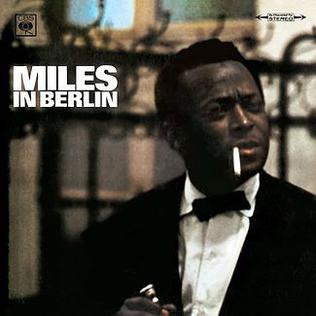
Miles in Berlin is a live album by Miles Davis from a performance at the Berliner Philharmonie on September 25, 1964 with his "Second Great Quintet," featuring tenor saxophonist Wayne Shorter, pianist Herbie Hancock, bassist Ron Carter and drummer Tony Williams, marking their first recorded work.

The Quintet is an album by V.S.O.P. It was compiled from two concert performances: one at the Greek Theatre, University of California, Berkeley, on July 16, 1977; the other at the San Diego Civic Theatre on July 18, 1977. The quintet were keyboardist Herbie Hancock, trumpeter Freddie Hubbard, drummer Tony Williams, bassist Ron Carter and saxophonist Wayne Shorter. The album was originally released in October 1977 as a 2-disc LP by Columbia Records.

A Tribute to Miles is a tribute album recorded by the then surviving members of the Miles Davis "Second Great" Quintet: pianist Herbie Hancock, saxophonist Wayne Shorter, bassist Ron Carter and drummer Tony Williams. Taking the Davis role was trumpeter Wallace Roney.

Quartet is the twenty-seventh album by jazz pianist Herbie Hancock, featuring a quartet with trumpeter Wynton Marsalis, bassist Ron Carter and drummer Tony Williams. It was originally issued in Japan on CBS/Sony, and later given a US release by Columbia.
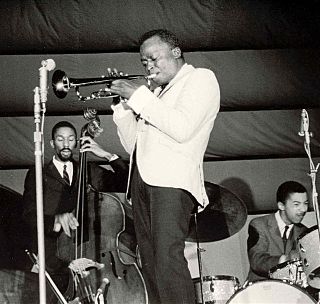
The Miles Davis Quintet was an American jazz band from 1955 to early 1969 led by Miles Davis. The quintet underwent frequent personnel changes toward its metamorphosis into a different ensemble in 1969. Most references pertain to two distinct and relatively stable bands: the First Great Quintet from 1955 to 1958, and the Second Great Quintet from late 1964 to early 1969, Davis being the only constant throughout.
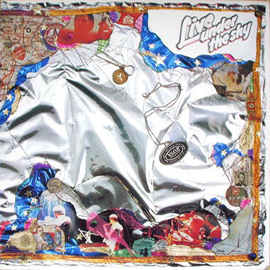
V.S.O.P : Live Under the Sky is a 1979 live album by the V.S.O.P. Quintet, a record of a performance at the 1979 Live Under the Sky Festival as it was performed live in Japan over two days. The first day, which took place during a furious rainstorm, was broadcast live on national television. The original release featured the first day, while the 2004 re-master/re-release also featured the second concert. This, the fourth VSOP release, once again featured pianist Herbie Hancock, saxophonist Wayne Shorter, drummer Tony Williams, bassist Ron Carter and trumpeter Freddie Hubbard.

Water Babies is a compilation album by American jazz trumpeter Miles Davis. It compiled music Davis recorded in studio sessions with his quintet in 1967 and 1968, including outtakes from his 1968 album Nefertiti and recordings that foreshadowed his direction on In a Silent Way (1969), while covering styles such as jazz fusion and post-bop. Water Babies was released by Columbia Records in 1976 after Davis had (temporarily) retired.

V.S.O.P. is a 1977 double live album by keyboardist Herbie Hancock, featuring acoustic jazz performances by the V.S.O.P. Quintet, along with jazz fusion/jazz-funk performances by the ‘Mwandishi’ band and The Headhunters.

Miles in Tokyo is a live album recorded on July 14, 1964, by the Miles Davis Quintet at the Tokyo Kōsei Nenkin Kaikan, Shinjuku, Tokyo, Japan. It was released in the United States on CD in 2005 and is the first recording of Davis in Japan. It is the only album to showcase an early incarnation of his Second Great Quintet featuring Sam Rivers on tenor saxophone, following George Coleman's departure; after this, Wayne Shorter's appointment completed the classic lineup that recorded such albums as ESP and Miles Smiles, through to Miles in the Sky.

Live at the 1963 Monterey Jazz Festival is a live album by Miles Davis recorded on September 20, 1963 and released July 31, 2007. Davis searched for new musicians for his quintet, after splitting with saxophonist John Coltrane in 1960. The new quintet consists of saxophonist George Coleman, pianist Herbie Hancock, bassist Ron Carter and drummer Tony Williams. It was recorded at the Monterey Jazz Festival in the early fall of 1963.

Live in Europe 1967: The Bootleg Series Vol. 1 is a 3 CD + 1 DVD live album of Miles Davis and his "Second Great Quintet," with saxophonist Wayne Shorter, pianist Herbie Hancock, bassist Ron Carter, and drummer Tony Williams. The CDs contain recordings of three separate concerts in Europe, and the DVD has two additional concerts from Karlsruhe and Stockholm.
References
- ↑ Ginell, Richard S. (2011). "V.S.O.P., Vol. 1 - Herbie Hancock | AllMusic". allmusic.com. Retrieved 18 July 2011.
- 1 2 "V.S.O.P. – Artist US chart history". Allmusic . Retrieved August 1, 2012.